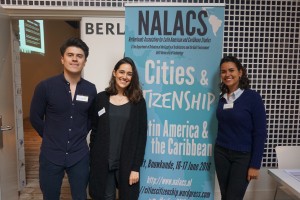 NALACS Conference 2016
NALACS Conference 2016
The Netherlands Association for Latin American and Caribbean Studies (NALACS), in cooperation with the Faculty of Architecture and the Built Environment of the Delft University of Technology,has organised the conference ‘Cities and Citizenship in Contemporary Latin America and the Caribbean,’ held on 16-17 June 2016 in Delft, the Netherlands.
This 2-day conference embraced a wide range of topics related to urban development and citizenship in Latin America and the Caribbean in several session tackling a wide range of subjects, from informal urbanisation to gender issues and violence. There was a total of 51 papers presented.
The board adopted the view propagated by Holstons and Appadurai, among others, that citizenship has to be conquered in a long and arduous process, and that this processes is intimately connected to the way people build and inhabit cities.
In their pioneering collection of essays ‘Cities and Citizenship’, Holston and Appadurai (1999) as well as other prominent scholars, stressed the importance of cities in the making of modern citizens. At the end of the twentieth century, they demonstrated that urban environments are salient sites for examining the renegotiations of citizenship, democracy, and national belonging.
This is arguably particularly the case in contemporary Latin America and the Caribbean, two regions that have experienced accelerated urbanization in the 20th century. Latin American and Caribbean cities seem to embody the aspirations of citizens and to showcase the best and the worse of their societies. It is cities that we can observe major opportunities and threats to development, security and human rights, as well as major struggles for rights, inclusion and democracy.
The conference started off with a screening of the film ‘Fighting for Peace’, from Dutch director and writers Joost van der Valk, and co-directed by British Mags Gavan. “Fighting for Peace focuses on two talented boxers, Sugar (15) and Douglas (14) who each face their personal fights at home. Sugar has to support his entire family from the money he earns with boxing. For Douglas boxing is the only way he can save his sister Sueli (aged 17) from Crackland, a dark place where crackheads prostitute and beg to feed their habits”. The film is a great sociological study of life in Rio favelas.
The two main keynote speakers addressed issues connected to this broad topic. Clara Irazabal (then at Columbia University, currently at the University of Missouri in Kansas City ) addressed the main challenges faced by metropolises in Latin America. On the second day, Prof. Dr. Rivke Jaffe from the University of Amsterdam presented a rather poetic talk entitled ‘Caribbean Cities and the Political Imagination’, where she discussed the representations of political struggles in the arts.
The conference also included an exhibition on Argentinean comics titled “Drawing on Violence: Comics from Argentina”, curated by Saskia van Drunen. In this exhibition, artists showed different aspects of urban violence in Argentinean cities. Urban violence, so prevalent in Latin America and the Caribbean, was one of the main topics of discussion in this conference, together with citizenship.
This conference was simultaneously the closure of a cycle and the beginning of a new one, with the renovation of the NALACS board, with four new members. It was one of the first steps to achieve a renovated and more dynamic NALACS.
Here you can find the final program of the conference. Conference Proceedings will be published in the Fall.
For pictures of the conference, please click HERE.












